Your website is your business identity, a means to success and brand recognition, which is the most important thing in the digital world. Today, the internet is a primary source of information, so it’s important that your website must be easy to discover by visitors seeking businesses just like yours. To ensure that users can find your website, it’s essential to submit it to search engines.
Search engine submission is an integral step in the process of getting your website indexed and listed in search results. To help you get started, let’s walk through exactly what it takes to submit your website to major engines:
Table of Contents
TogglePrepare Your Website:
Before submitting your site for public viewing, it is recommended to ensure that it has a clear structure, thoughtful design, and user-friendly navigation. Check for technical errors and any broken links. Create high-quality content that is engaging and error-free, which is crucial for creating compelling website content. Test your website on different devices and browsers to ensure compatibility. Also, make sure your hosting plan can handle potential traffic. Once you have addressed these aspects, your website will be ready for launch.
Creating and Submitting a Sitemap:
Generating an XML sitemap is essential for providing search engines with detailed and accurate information about your website. This facilitates easier discovery and crawling of all your site’s pages by search engine bots, ensuring quick and precise indexing. Submitting your sitemap is a crucial step in effective website indexing. Begin by creating a sitemap using online tools or plugins, then, in Google Search Console, navigate to “Sitemaps” after signing in, and submit your sitemap by entering its name, such as “sitemap.xml”. Update your sitemap whenever significant changes are made, ensuring efficient crawling and indexing by search engines. By doing so, you enhance your website’s visibility in search results, ultimately attracting more organic traffic.
Sign up for Webmaster Tools:
When submitting your website, it’s essential to register for webmaster tools from major search engines like Google Search Console and Bing Webmaster Tools. With Google Search Console, sign in using your Google account or create a new one and add your website as a property. This allows you to monitor your site’s performance, fix issues, and submit a sitemap for indexing.
Similarly, with Bing Webmaster Tools, sign in using your Microsoft account or create a new one and add your website. These tools provide insights specific to each search engine, helping you optimize your website’s visibility and guide search results.
Using Google My Business (GMB)
When submitting your website to search engines, consider creating a GMB account, particularly if you have a local business. Sign in or create a Google account, add or claim your business on GMB, and ensure your profile has accurate details, including the website URL. Optimize the website link with relevant keywords, upload high-quality images, and encourage customer reviews. Regularly share updates and promotions on GMB, monitor insights, and keep information up to date. This effective use of GMB enhances local search presence and improves website visibility, making it easier for potential customers to discover and engage with your business online.
Submit a Page URL to Google
To submit a page URL to Google, use Google Search Console. Sign in and select your website, then access the “URL Inspection” tool to enter the page URL and check its indexing status. You can click “Request Indexing” if needed or use the “Fetch as Google” tool to request indexing of a specific page. Manual submission is helpful for ensuring prompt indexing of new or updated content, although Google usually discovers and indexes pages automatically.
Yahoo (Powered by Bing):
Submitting your website to Bing does not automatically submit it to Yahoo. While Bing powers Yahoo’s search results, the submission process for each search engine is separate. To ensure your website appears on Yahoo, it is recommended to submit your website directly to Yahoo through Yahoo Site Explorer or use the specific submission option provided for Yahoo in Bing Webmaster Tools.
Explore other Search Engines
In addition to Google, Bing, and Yahoo, it’s worth considering other search engines like Yandex and DuckDuckGo. Yandex offers webmaster tools called Yandex Webmaster, allowing website owners to improve rankings and submit sitemaps. DuckDuckGo does not have webmaster tools or a formal submission process since its search results come from multiple sources. To get listed on DuckDuckGo, focus on general SEO practices like creating quality content and acquiring backlinks.
Regularly Monitor Webmaster Tools:
To maintain good search engine visibility, keep your website information updated. Update your sitemap regularly, use search engine tools to monitor performance, and make adjustments accordingly. This includes optimizing content, fixing broken links, and addressing technical issues. By staying proactive, you can ensure that your site remains visible and continues to attract organic traffic.
How to Check if your Website is Indexed:
Don’t just think that if you have submitted your website, your job is done. Once the website is submitted, it’s important to check if it is submitted or not. Here’s a simple way to check:
In Google Search Console: Sign in to Google Search Console and select your website. Then go to the “Pages” section, and inside that “Index” section will tell you if your website is indexed.
Another way is to try a Search Query: Type “site:yourwebsite.com” into a search engine. If your pages appear in the results, then they are indexed.
Reasons for Submitting your Website to Search Engines:

Now you have submitted and checked your website presence on search engines, you must know why submitting a website is a requirement:
- Enhanced Visibility:
Submitting your website to search engines is like raising a flag to signal the existence of your website to search engines. By doing so, you can ensure that your site is acknowledged and more likely to be seen by potential visitors in search results, contributing to increased online visibility.
- Efficient Indexing:
When you submit a sitemap to search engines, you provide them with an organized map of your website’s structure. This helps search engines efficiently crawl and index your web pages. By conducting the indexing process, search engines can quickly include your website in their databases. This means that your website will have a better chance of appearing in search results sooner, leading to increased visibility for your site.
- Improved Rankings:
Regularly submitting and updating your website can have a positive impact on its search engine rankings. When search engines frequently index your site, they gain a better understanding and appreciation of your content, which can lead to higher rankings in search results. To optimize your website’s visibility, focus on understanding search engine algorithms, implementing best practices, and tracking and analyzing rankings.
- Targeted Traffic:
By submitting your website to search engines, you increase your chances of appearing in search results for relevant user queries. This helps ensure that your site is seen by users who are specifically seeking information or products related to your niche. As a result, you’ll likely receive more quality traffic to your site.
- Comprehensive Insights:
Utilizing search engine analytics and insights is crucial for understanding your website’s performance. These tools provide valuable data on user behavior, search queries, and indexing status, giving you insights into how users interact with your site. By regularly monitoring these analytics, you can make informed decisions to optimize your online presence. This allows you to adjust your content strategy, improve user experience, and drive more targeted traffic to your website.
- Competitive Edge:
In a competitive digital space, actively submitting and optimizing your website sets you apart from competitors who may overlook this crucial step. By regularly updating your site and implementing SEO best practices, you increase your chances of capturing the attention of search engines and potential visitors.
- Global Reach:
Search engines serve as a gateway to a global audience, and by submitting your website, you make it accessible to users worldwide. This means that not only local users but also people from different regions and countries can find and access your website. By broadening your reach to an international audience, you have the opportunity to expand your customer base and increase your chances of reaching new markets. It’s an excellent way to grow your online presence and attract a diverse range of visitors to your website.
- Algorithm Adaptation:
As search engine algorithms evolve and change over time, submitted websites have a better chance of adapting to and benefiting from algorithmic changes. By submitting your website on a regular basis, you ensure that it stays in sync with the latest search engine requirements and best practices. This helps to maximize your website’s compatibility with search engine algorithms, increasing your chances of ranking higher in search results. Regular submissions can help you stay ahead of the curve and give your website the best chance of success in a constantly changing online space.
Final thought:
Many professional SEO services experts point out that, submitting your website to search engines through platforms like Google Search Console is crucial for efficient indexing and improved online visibility. By regularly checking your website’s indexation status, you can ensure it is recognized in search results, allowing for timely adjustments. The strategic reasons behind website submission, such as enhanced visibility and targeted audience reach, highlight its importance in the competitive digital landscape. By understanding and implementing these aspects, your website can be optimally placed for success.
Also read: Website Health Check: The Importance of Regular SEO Audits












